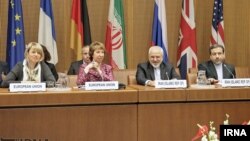High level nuclear negotiations between Iran and the P5+1 countries, coordinated by the European Union, have resumed in Vienna. The parties have been seeking a comprehensive agreement concerning Iran’s nuclear program. The negotiations are expected to last through July 20.
Writing in the Washington Post, Secretary of State John Kerry said the negotiations have always been about a choice for Iran’s leaders: “They can agree to assure the world that their country’s nuclear program will be exclusively peaceful and not be used to build a weapon, or, they can squander a historic opportunity to end Iran’s economic and diplomatic isolation and improve the lives of their people.”
Secretary Kerry noted the positive steps Iran has taken over the course of the negotiations, including eliminating its stockpile of higher levels of enriched uranium, refraining from further advances at its enrichment facilities and heavy water reactor, and allowing new and more frequent inspections. In exchange, the P5+1 countries and the European Union have provided limited financial relief to Iran, even while the vast majority of sanctions have remained in place.
But now Iran must choose to accept what Mr. Kerry called “a series of reasonable, verifiable and easily achievable measures that would ensure Iran cannot obtain a nuclear weapon and that its program is limited to peaceful purposes. In return, Iran would be granted phased relief from nuclear-related sanctions.”
What will Iran choose? The answer is not clear, said Mr. Kerry. “Substantial gaps,” he noted, “still exist between what Iran’s negotiators say they are willing to do, and what they must do to achieve a comprehensive agreement.” And those gaps are not caused by excessive demands on the part of the EU and P5 +1. On the contrary, Secretary Kerry said, our negotiators “have listened closely to Iran’s questions and concerns…and have worked closely with Iran to design a pathway for a program that meets all of the requirements for peaceful civilian purposes.”
However, to reach a comprehensive solution and gain relief from sanctions in the time that remains, Iran must address the international community’s legitimate concerns and demonstrate that its nuclear activities are what its leaders claim them to be.
“The chance does not often arise to reach an agreement peacefully that will meet the essential and publicly expressed needs of all sides, [and] make the world safer,” said Secretary of State Kerry. “We have such an opportunity…It’s a matter of choices. Let us all choose wisely.”






